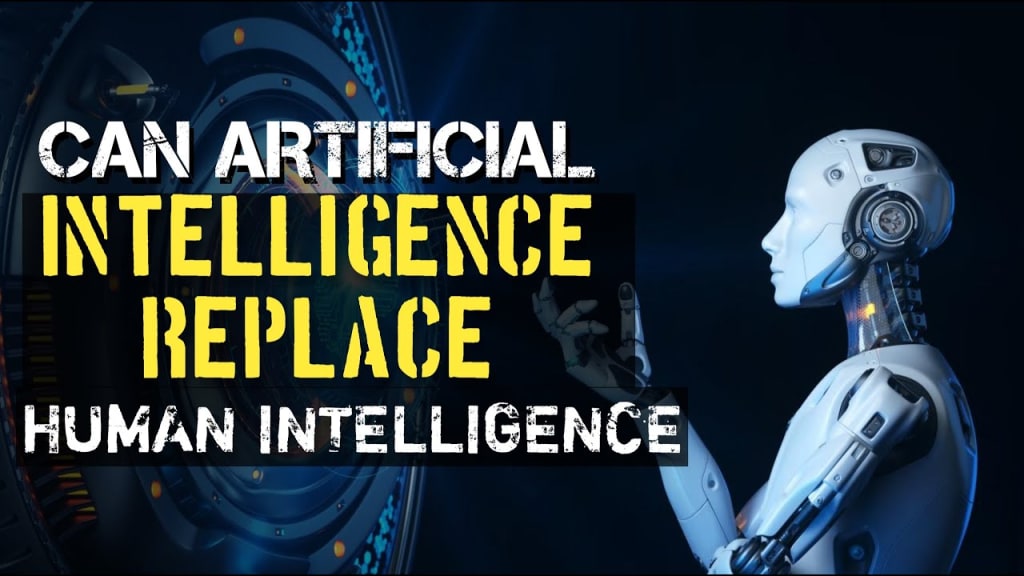Can AI replace Human intelligence?
Artificial Intelligence

Artificial intelligence (AI) has been a buzzword in the tech industry for years, but as technology advances, the question of whether AI could replace human intelligence has become more prevalent. While AI is capable of performing many tasks with a level of accuracy and efficiency that humans cannot match, it is unlikely that it will replace human intelligence completely.
One of the fundamental differences between AI and human intelligence is their approach to problem-solving. Human intelligence is characterized by a range of abilities such as creativity, empathy, and problem-solving, which are currently beyond the capabilities of AI. Humans can understand complex problems, analyze them, and come up with creative solutions that may not be immediately obvious. This ability is rooted in our experiences, emotions, and social interactions, which shape our worldview and inform our decision-making process. AI, on the other hand, is limited to the data it has been trained on, and can only provide solutions based on that data. While AI can process vast amounts of information quickly, it lacks the ability to contextualize that information and consider the broader implications of a problem.
Another crucial aspect of human intelligence is empathy. Empathy is the ability to understand and relate to the emotions of others. It allows us to connect with others on a deeper level and form meaningful relationships. AI does not possess this ability and cannot truly understand the emotions of others. While AI can be programmed to respond to certain emotions in specific ways, it cannot replicate the depth and complexity of human emotion.
Furthermore, AI lacks creativity, which is a fundamental aspect of human intelligence. Creativity is the ability to generate new ideas and concepts, and to approach problems from novel angles. While AI can be used to automate certain creative tasks, such as generating music or art, it cannot replicate the human experience of creating something entirely new.
Despite these limitations, AI has the potential to enhance human intelligence in many ways. For example, AI can be used to augment human decision-making by providing insights and recommendations based on data analysis. Additionally, AI can be used to automate repetitive or mundane tasks, freeing up time for humans to focus on more complex and creative work.
In some cases, AI has already proven itself to be more effective than humans. For example, AI has been used in the healthcare industry to analyze medical images and diagnose diseases with a level of accuracy that exceeds that of human doctors. AI has also been used in finance to analyze data and make investment decisions that outperform human investors. However, in both of these examples, AI is not replacing human intelligence, but rather augmenting it.
Furthermore, there are some tasks that AI will never be able to perform. For example, AI cannot replace human creativity in the arts. While AI can generate music or art, it lacks the emotional depth and connection that comes from human creativity. Similarly, AI cannot replicate the experience of human connection and empathy that comes from social interactions.
It is also worth noting that AI is not infallible. AI systems are only as good as the data they are trained on, and biases in that data can lead to biased AI systems. Additionally, AI is vulnerable to attacks and errors that can lead to incorrect decisions or outcomes. As such, it is important to use AI in conjunction with human intelligence to ensure that decisions are made with a balanced and nuanced approach.
In conclusion, while AI is a powerful tool that can complement human intelligence in many ways, it cannot replace human intelligence altogether. The unique abilities of human intelligence, such as creativity, empathy, and problem-solving, are currently beyond the capabilities of AI. As such, it is essential that we continue to develop AI in ways that augment and enhance human intelligence rather than replace it. By working together, humans and AI can achieve more than either could on their own.





Comments
There are no comments for this story
Be the first to respond and start the conversation.